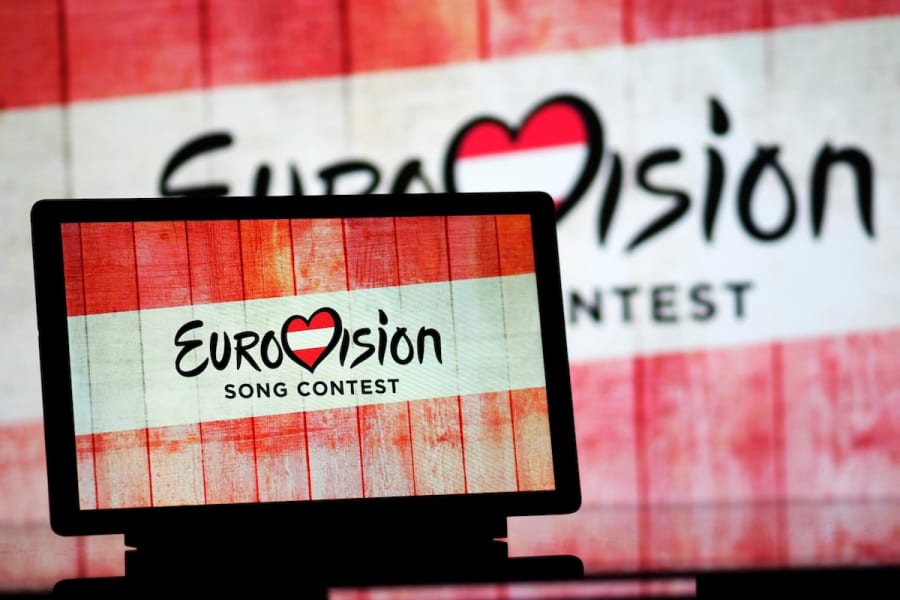Austria seeks to keep Israel in Eurovision contest

The Eurovision contest host Austria seeks to secure Israeli participation ahead of the European Broadcasting Union’s decision on the issue next month. Roland Weißmann, the director general of the Austrian public broadcaster ORF, which is hosting next year’s Eurovision contest in Vienna, travelled to Israel during the weekend where he met Israeli President Isaac Herzog and Golan Yochpaz, the CEO of Israel’s public broadcaster KAN.
A KAN spokeswoman announced that the purpose of Weißmann’s visit to the Jewish state was “working to ensure that Israel participates in the Eurovision Song Contest” in 2026.
Speaking to Herzog, Weißmann emphasized, according to KAN, that “Israel is an integral part of the contest.”
Israel has participated in Eurovision since 1973 and has won the competition four times, in 1978, 1979, 1998 and 2018.
There have been vocal calls for boycotting and excluding Israel from the Eurovision competition due to the Hamas-initiated war in Gaza. Countries like Ireland, Spain and the Netherlands have threatened to boycott the event if the Jewish state participates. Furthermore, Belgium, Slovenia and Iceland have also warned that they would also consider boycotting the event if Israel is permitted to participate.
In contrast, Austria and Germany have criticized the boycott calls against Israel and insisted that the Jewish state should participate. France has also backed Israel’s participation in the competition.
“Cultural boycotts are stupid and pointless; they don't get us anywhere," Austrian Deputy Foreign Minister Sepp Schellhorn stated in September during an interview with the Austrian news outlet KURIER.
“Art and culture are of essential importance,” he argued. “Cultural exchange enables dialogue; it builds bridges. Especially in times like these, this is more important than ever,” Schellhorn added, likely referring to the ongoing conflicts worldwide including the Gaza war.
The Austrian Chancellor Christian Stocker echoed similar sentiments. Addressing the controversial issue last month, he stressed that it would be “a fatal mistake to exclude Israel” from the Eurovision competition, adding that “based on our history alone, I would never be in favor of that,” likely referring to Austria’s role in the Nazi-perpetrated Holocaust of six million Jews. Many of Nazi Germany’s top leaders including Adolf Hitler and Adolf Eichmann were of Austrian descent.
Germany went even further and warned that it would boycott Eurovision if Israel was not permitted to participate in the event.
Some Israel critics have argued that the Jewish state should not participate in the competition amid the war against Hamas in Gaza. However, following the American-brokered Gaza ceasefire in October, the European Broadcasting Union (EBU) announced that it would postpone its decision on Israeli participation at the event.
“The Board agreed to put the issue on the agenda of its ordinary Winter General Assembly, which will be taking place in December,” the EBU stated, referring to recent “developments” in the Middle East.
Yuval Raphael, a survivor of the Nova Music Festival massacre, won the second place for Israel at this year’s Eurovision competition final in Switzerland. While many of the jury panels boycotted Raphael, the Israeli singer secured the largest number of votes from the European public.
Keren Peles, a judge on the Israeli music show “Hakochav Haba” who wrote the Israeli Eurovision ballads for the 2024 and 2025 contests, argued that the time had arrived for a more uplifting song following the return of all living Israeli hostages.
“I think the person who represents us this year deserves to sing a song that is appropriate for their age, and we can flip a switch and smile and sing about ‘Espresso Macchiato,'” Peles said, referring to Estonia’s 2025 Eurovision song.

The All Israel News Staff is a team of journalists in Israel.
You might also like to read this:

















